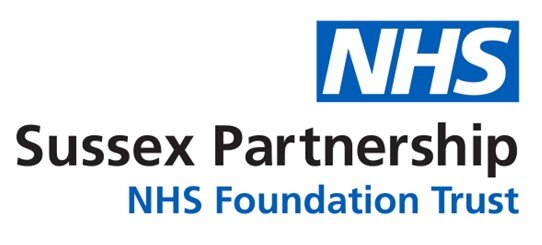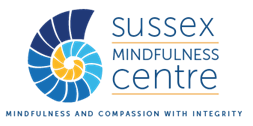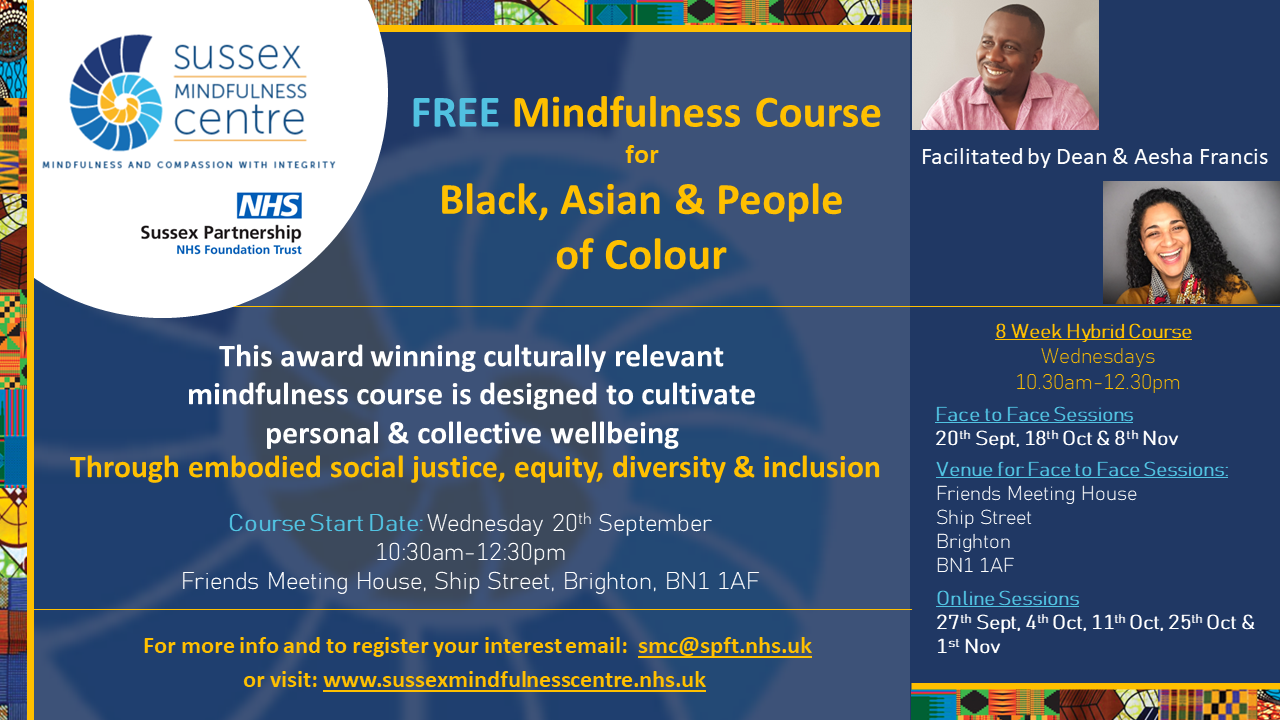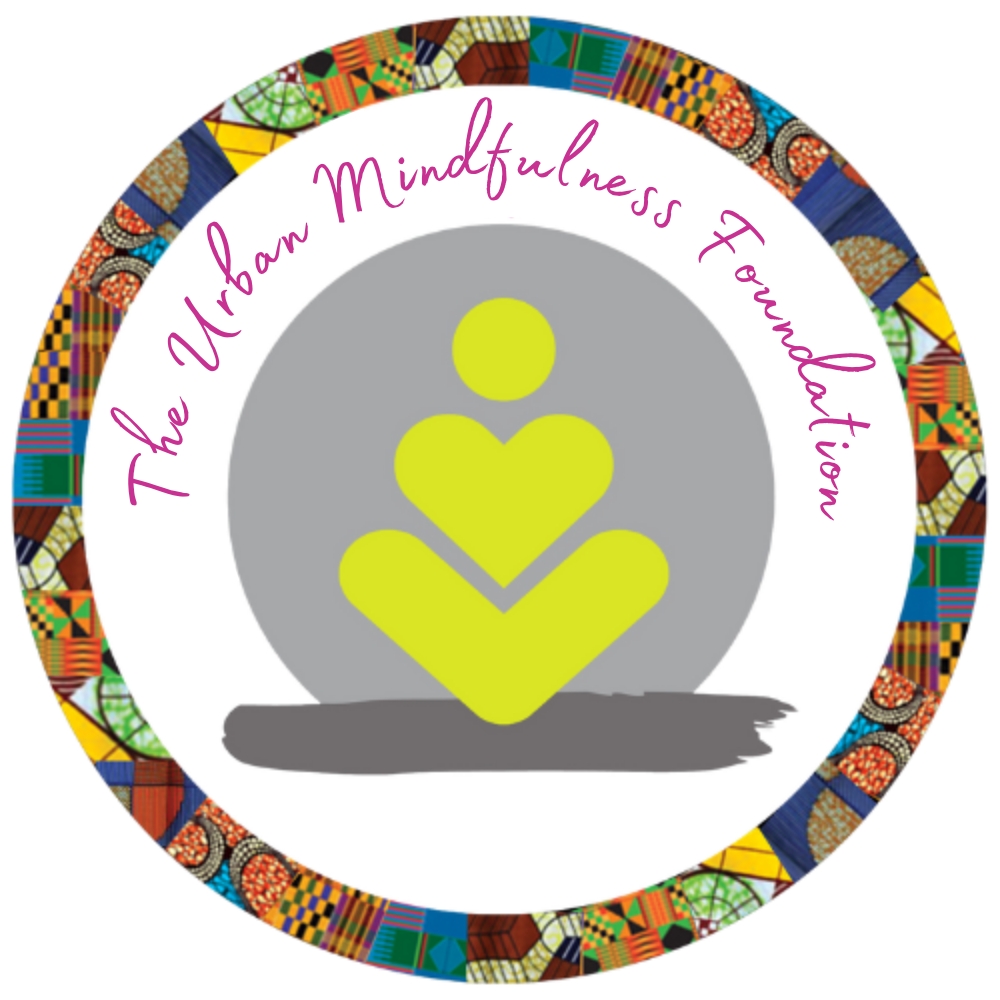We offer the above courses in bespoke formats, from half-day workshops, full-day workshops, and weekend, weekly or monthly sessions depending on requirements. Get in touch for more info
UMF Mindfulness services to the NHS





Socially and Culturally Relevant
Our provisions to the NHS are focused on supporting IAPT trainee mindfulness teachers and supporting recovery colleges and CAMHS with training designed to build awareness of cultural adaptations, language and themes that can help to address some of the cultural barriers to mindfulness practice.
We also provide culturally informed mindfulness seminars, master classes and courses to NHS mindfulness teachers and NHS commissioners interested in widening access to mindfulness through cultural relatability and appropriateness.
Other provisions include communal respite mindfulness practice and drop-in sessions for NHS staff from black, African, Caribbean, Asian and People of Colour communities designed and delivered by people with lived experience of being from those communities and working in the NHS. We consider this targeted support for NHS staff wellbeing to be of paramount importance to the ultimate performance of the NHS, particularly given that over 40% of the NHS workforce are from UK minority backgrounds.
The work we do is backed by
NICE quality standards and guidelines!
See Quality Standard [QS167]Published: 11 May 2018
Promoting health and preventing premature mortality in black, Asian and
other minority ethnic groups
Download NICE Standard here

Working Examples
We had the honor of running two Beyond the Basics – Exploring Mindfulness Based Inclusion Training and the social web of interaction for the Scottish NHS Mindfulness Network in 2022.
We came together to look at what mindfulness can bring to the table around social inclusion and what an awareness of our social context can bring to our practice and explored how our differences can unify us rather than separate us and how mindfulness can be presented to diverse groups and individuals in a way that is most appropriate.
Unpacking some of the habitual patterns, perceptions, projections, assumptions, and goals that we use to navigate the world by increasing awareness of how much of what we call our own ‘reality’ is shaped by wider social influences.
The aim of the sessions was for mindfulness teachers and practitioners to become more adept at recognising how we are relating in a diverse world so that we can better cultivate a sense of agency, purpose, self-worth, and humility to ‘widen the circles of compassion’ and create a more inclusive mindfulness practices that is grounded in radical inclusive care.
In 2023 the Urban Mindfulness Foundation worked in collaboration with Sussex Mindfulness Centre in partnership with Sussex Partnership NHS Foundation Trust (SPFT) to deliver an 8 week Mindfulness Based Inclusion Training (MBIT) course for Black, Asian and People of Colour based in Brighton and Hove. This course was funded by Health Education England to ensure all participants could attend for FREE.

Current
Another uplifting project funded by the East London NHS Foundation Trust (ELFT) in partnership with Compass Wellbeing and supported by Westfield Shopping Centre is the Big Up Your CHESS Project. This project offers a week courses and drop in sessions for Black, African, Caribbean, Asian and People of Colour aged between 18-25 year olds. Living, working or studying in Newham Hackney and Tower Hamlets. Sign up or refer someone here.


Bridging
By focusing on delivering mindfulness at the community level in strategic partnership frameworks with the NHS and health care services. The Urban Mindfulness Foundation provide an important and unique bridge between underserved and marginalised communities and access to the NHS and statutory health care services.
The Urban Mindfulness Foundation seeks to act as a bridge of trust between the BPOC community and statutory care services, that ensure services are needs appropriate to the lived experience of marginalised people. This is done by focusing our provisions on preventative applications in the community that bring awareness to the broader social determinants of health such as prejudice, discrimination, social conditioning, environmental factors, systemic structures and intersectionality, which can often stack to cause significant psychological harm and impaired health effects.
Let’s not blur the lines too much!
It is important to confirm that the Urban Mindfulness Foundation are independent of the NHS and operates at the grassroots level within communities. Moreover, social mindfulness practice has some fundamental differences in the intentions, motivations and outcomes of practice to that of clinical interventions so it is important to highlight that our programmes are for those living well with mental health, those working with marginalised communities and those with lived experience of marginalisation who wish to understand the issues around identity-based harm and embodied whats necessary for transforming it.
As part of social mindfulness practice, we also explore the social determinants of health and develop key skills required to navigate the challenges they present in a way that facilitates and maintains personal and collective wellness. Consequently, our social mindfulness is specifically considered a preventative or maintenance practice designed for staying well and combating the isolation and loneliness perpetuated by identity-based harm whilst stimulating agency, purpose, self-worth and gratitude amidst perceived adversities.

If you would like to hear more about what we can offer please get in touch
Courses offered in Health settings
-
-
- Mindfulness Based Living Course (MBLC) – Bespoke
- A Compassionate Life Course (ACLC) – Bespoke
- Mindfulness Based Inclusion Training – bespoke for health care (MBIT – for health care)
-
FREE Provisions
Proceeds from our services to the NHS and Health Care Institutions are directed towards ensuring the ongoing provision of Free context-specific and culturally aware mindfulness training for those from disadvantaged, underserved and marginalised communities. Particularly for those who would not normally be able to access mindfulness training due to relatability or costs.
